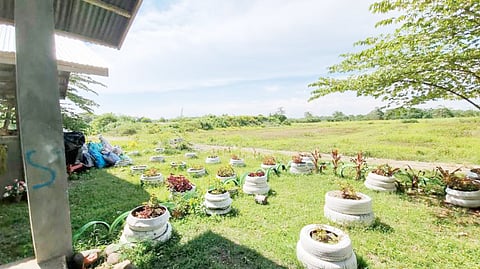
- NEWS
- the EDIT
- COMMENTARY
- BUSINESS
- LIFE
- SHOW
- ACTION
- GLOBAL GOALS
- SNAPS
- DYARYO TIRADA
- MORE

"Lapit, mga kaibigan at makinig kayo
Ako'y may dala-dalang balita galing sa bayan ko
Nais kong ipamahagi ang mga kwento
At mga pangyayaring nagaganap sa lupang ipinangako." — Asin
Tulunan — Several women in Tulunan, North Cotabato are currently reinventing organic farming, working to produce much-needed alternative fertilizer in just three days using food waste that can be used for smarter, healthier and more organic agriculture.
Lorie Pablo Daquioag, a satellite engineer, has introduced what she calls a Compost Activator Solution, a planting kit solution that processes waste into fertilizer. She developed the product as she was developing her start-up enterprise known as Waste for Good, spearheading the research in collaboration with a group of experts coming from the agriculture industry, engineering, and marketing, among others.
Daquioag, who traces her roots to Tubungan, Iloilo, said the inspiration for her product innovation is the Bokashi balls, a Japanese system that "binds" food waste and converts it to fertilizer for garden soil.
According to Philippine waste volume data, in 2021 the country generated 56.12 million tons of biodegradable waste. Some 10.45 million tons came from urban households.
Daquioag's planting kit package includes 1,000 ml of CAS, an up-cycled waste bucket with 15 liters' capacity, three packs of seeds, 10 pieces of planting pots, compost soil and a 250-ml measuring cup.
Based on initial findings, the kit can help reduce biodegradable waste by 87 percent in six weeks. Daquioag said crops undergoing the CAS treatment turn out to be heavier and bigger, with more nutrients by as much as 32 percent.
"Currently, every urban mom can spend at least a cost-efficient $79 a year using the W4G planting kit," she added. "In return, they could have savings of as much as $200 a year from buying veggies and utilizing the 482 kilograms per year of bio-waste used for organic farming."
The kit can be applied not only to food waste but also to paper, leaves and other similar waste products. And it abolishes the usual three weeks' waiting time for tedious composting.
As a result, users can harvest crops in 48 days — the harvest 32 percent larger and 30 percent faster compared to other solutions offered at present, Daquioag said.
Practical solutions
The W4G has a pending proposal with the Department of Science and Technology to further develop the project.
"Since I was a child, I have been fond of finding solutions to certain problems. I got used to fixing furniture, redesigning clothes, and even repairing our electrical circuits at home. Eventually, I studied engineering in college. That's where we tackled solving problems and offering practical solutions," Daquiaog said.
She underwent further training for her research as a space engineer for the Philippine Maya Satellite, where she explored a variety of data on emissions in the atmosphere.
"At the height of the Covid-19 pandemic, I realized I needed something to do to solve issues that hound the environment," she said.
She decided to embark on her long-held idea of developing her own smart bin or intelligent waste management system.
That's how she came up with CAS. She was then encouraged to apply for the Ashoka grant, a program that helps institutions develop high-impact social entrepreneurs in the Philippines and in the whole of ASEAN.
"I am thankful a lot to Ashoka for considering me as their fellow. My problem-solving skills were sharpened after I attended several of their trainings on social entrepreneurship," Daquiaog said.
Social entrepreneurship
Tulunan is the first municipality to try out CAS. Maria Lourdes Limbungan, Tulunan's municipal administrator, said that they wanted to optimize Daquiaog's project not only to solve the community's waste problems but also to help provide livelihood to local women.
"We the LGU have offered to Engineer Lorie our old sanitary landfill as her demo farm, especially in the area of the open dumpsite. We have a group of women dubbed TUWID (Tulunan Unified Women's Initiative for Development) that aims to harvest plants such as bell peppers, pumpkins and papaya trees from the organic farms as part of our barangay-based social entrepreneurship programs."
Most of the women beneficiaries of the project were victims of the 6.6-magnitude earthquake that hit the region on 29 October 2019.
To expand the project, the LGU plans to make pickled papaya, chili sauce, and pastes and noodles. "The project will also help us in our feeding programs for children," Limbungan said.
In its upcoming fiesta this November, Tulunan will recognize Daquioag as one of its outstanding residents for her contributions to the town.
Waste management
For his part, John Bernabe Baylan, sanitary inspector of the Municipal Environment and Natural Resources Office, said he believes Daquiaog's technology can help alleviate the problems of waste management in their town.
"Several months ago, our sanitary landfill was ordered closed by the Department of Environment and Natural Resources Central Office because of technicalities. We see hope for the W4G to help us in our waste problems."
Of Tulunan's 29 barangays, only seven are lowland areas. "We're having a hard time bringing our solid waste management programs to the hinterland areas. We hope that Engineer Lorie's project can help us address these challenges," said Baylan.
Janet Tabugan, 47, a massage therapist, helps gather indigenous materials needed for the composting kit. Part of her work is to deploy micro traps to capture microorganisms in the hinterlands. She is one of many local women now involved in this pioneering social entrepreneurship project.
"Great change starts in ourselves," Daquioag said. "It starts with our own mindset and roots and goes out to our own networks and our environment. Establishing new systems or changing established systems is not easy and impossible to do alone. But we can do it. And we should strive not only to lead, but also to leave a trail to be followed by the next generations."
